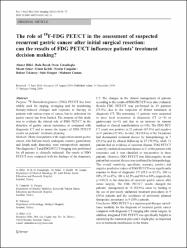The role of F-18-FDG PET/CT in the assessment of suspected recurrent gastric cancer after initial surgical resection: can the results of FDG PET/CT influence patients' treatment decision making?

Göster/
Erişim
info:eu-repo/semantics/embargoedAccessTarih
2011Yazar
Bilici, AhmetÖven Ustaalioğlu, Bala Başak
Şeker, Mesut
Kefeli, Umut
Canpolat, Nesrin
Tekinsoy, Bülent
Özuğur, Şule
Gümüş, Mahmut
Üst veri
Tüm öğe kaydını gösterKünye
Bilici, A., Öven Ustaalioğlu, B. B., Şeker, M., Kefeli, U., Canpolat, N., Tekinsoy, B. ... Gümüş, M. (2011). The role of F-18-FDG PET/CT in the assessment of suspected recurrent gastric cancer after initial surgical resection: can the results of FDG PET/CT influence patients' treatment decision making? European Journal of Nuclear Medicine and Molecular Imaging, 38(1), 64-73. https://dx.doi.org/10.1007/s00259-010-1611-1Özet
F-18-fluorodeoxyglucose (FDG) PET/CT has been widely used for staging, re-staging and for monitoring therapy-induced changes and response to therapy in patients with various types of cancer, but its utilization for gastric cancer has been limited. The purpose of this study was to evaluate the clinical role of FDG PET/CT in the detection of gastric cancer recurrence as compared with diagnostic CT and to assess the impact of FDG PET/CT results on patients' treatment planning.Thirty-four patients with suspected recurrent gastric cancer, who had previously undergone curative gastrectomy and lymph node dissection, were retrospectively analysed. The diagnostic CT and FDG PET/CT imaging were performed for all patients as clinically indicated. The results of FDG PET/CT were compared with the findings of the diagnostic CT. The changes in the clinical management of patients according to the results of FDG PET/CT were also evaluated.FDG PET/CT was performed in 19 patients (55.9%) due to the suspicion of distant metastasis at diagnostic CT. The remaining 15 patients were suspected to have local recurrence at diagnostic CT (n = 4) or gastroscopy (n = 1) and due to an increase in tumour markers or clinical manifestations (n = 10). The FDG PET/CT result was positive in 23 patients (67.6%) and negative in 11 patients (32.4%). In total, 24 (70.6%) of the 34 patients had documented recurrent disease by histopathology in 7 (29.1%) and by clinical follow-up in 17 (70.9%), while 11 patients had no evidence of recurrent disease. FDG PET/CT correctly confirmed recurrent disease in 23 of the patients with recurrence and it was classified as true-positive in these patients. However, FDG PET/CT was false-negative in one patient but recurrent disease was confirmed by histopathology. The overall sensitivity, specificity, accuracy, positive and negative predictive values of FDG PET/CT were significantly superior to those of diagnostic CT (95.8 vs 62.5%, 100 vs 10%, 97 vs 47%, 100 vs 62.5% and 90.9 vs 10%, respectively, p = 0.012) in the detection of recurrent gastric cancer after initial surgery. The FDG PET/CT results changed the patients' management in 18 (52.9%) cases by leading to the use of previously unplanned treatment procedures in 9 (50%) patients and the avoidance of previously planned therapeutic procedures in 9 (50%) patients.FDG PET/CT is a superior post-therapy surveillance modality for the diagnosis of recurrent gastric cancer compared with diagnostic CT imaging after initial surgery. In addition, integrated FDG PET/CT was specifically helpful in optimizing the treatment plan and it might play an important role in treatment stratification in the future.
WoS Q Kategorisi
Q1Scopus Q Kategorisi
Q1Kaynak
European Journal of Nuclear Medicine and Molecular ImagingCilt
38Sayı
1Koleksiyonlar
- Makale Koleksiyonu [3751]
- PubMed İndeksli Yayınlar Koleksiyonu [4203]
- Scopus İndeksli Yayınlar Koleksiyonu [6522]
- WoS İndeksli Yayınlar Koleksiyonu [6585]

















